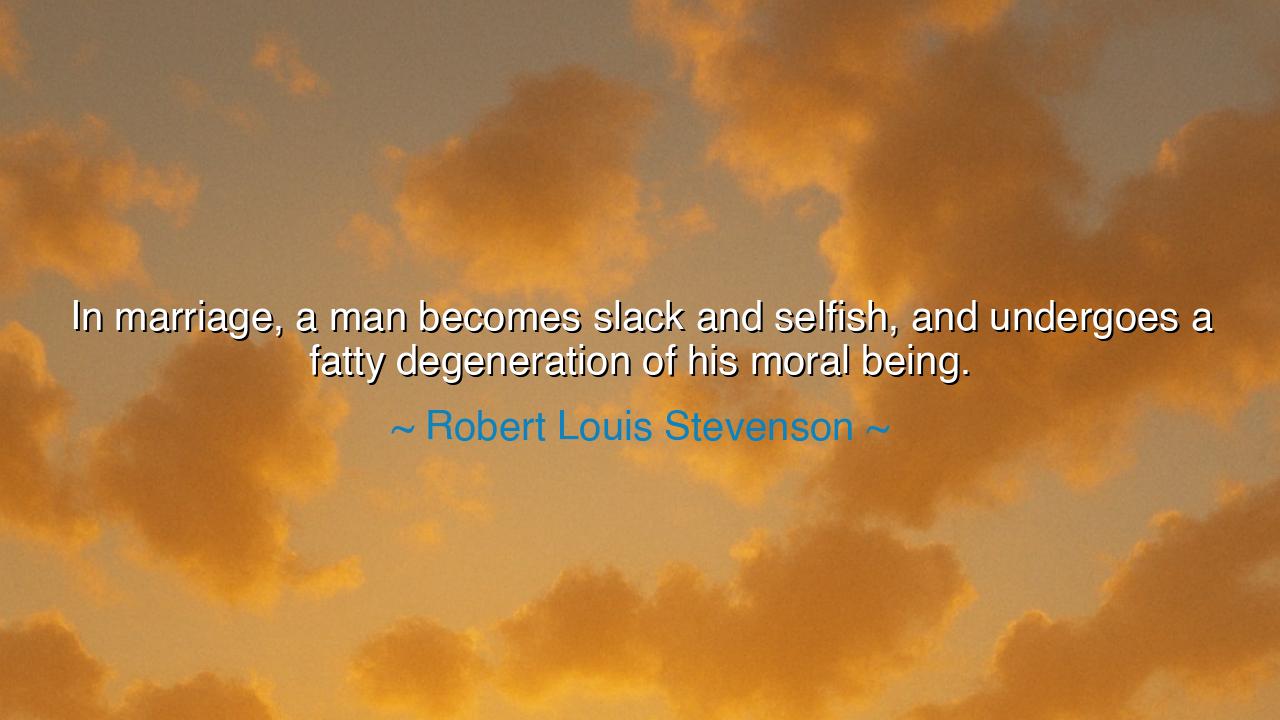
In marriage, a man becomes slack and selfish, and undergoes a
In marriage, a man becomes slack and selfish, and undergoes a fatty degeneration of his moral being.






In the sharp yet reflective words of Robert Louis Stevenson, the Scottish poet and philosopher of the soul, we encounter both irony and insight: “In marriage, a man becomes slack and selfish, and undergoes a fatty degeneration of his moral being.” Though wrapped in humor, the line conceals a deep truth about the human condition. Stevenson, master observer of the heart’s frailty, speaks here not merely to mock the institution of marriage, but to warn of a spiritual decay that may follow comfort. For when love ceases to challenge, it can grow complacent; and when duty no longer demands striving, the fire of character may dim. The words remind us that ease, if not tempered by effort, can erode even the noblest of spirits.
The origin of this quote lies in Stevenson’s writings and reflections on the social and moral habits of men, particularly in the context of Victorian society. As a keen essayist, he often wrote about the contradictions between ideal and reality, virtue and comfort. He observed that marriage, though founded on love and loyalty, can lull a person into spiritual idleness. In youth and solitude, a man struggles, dreams, and aspires—but once settled, he may lose the sharpness of ambition and the purity of self-discipline. Stevenson saw this not as condemnation of marriage itself, but as a warning to the human soul: that happiness without purpose can become indulgence, and affection without striving can dull the moral edge of life.
The ancients knew this truth well. Plato warned that when men live without continual self-examination, they fall into a state of softness, mistaking pleasure for virtue. Aristotle, too, spoke of the “golden mean,” where balance is found only through conscious effort. Stevenson’s words echo this timeless wisdom: that man, when surrounded by comfort, must guard against spiritual lethargy. Marriage, when misused, becomes not a partnership of growth but a cushion against effort—a gentle prison of indulgence. The “fatty degeneration of moral being” he describes is the slow withering of the will, a corrosion of inner vitality masked by outward peace.
Consider the story of King David in the scriptures. When he was young, a shepherd and warrior, he was fierce, humble, and just. Yet when he reached the height of power, surrounded by comfort and adoration, he fell into sin and complacency. He forgot the hunger that once shaped him. Only after his fall did he regain his sense of purpose and humility. Stevenson’s insight speaks to this same pattern: that when the heart ceases to labor, it begins to rot. It is not marriage itself that corrupts, but the failure to keep one’s soul alive within it—to continue the daily work of love, virtue, and growth.
Stevenson’s wit conceals a moral fire. His phrase “slack and selfish” is not merely an insult but a mirror. He suggests that many enter marriage as if it were an end—a destination where struggle ceases. But in truth, marriage should be the beginning of a new journey, where two souls labor together toward a shared ideal. When a man ceases to strive for his partner’s happiness, when he grows content with mere existence, he not only fails his marriage but diminishes himself. Love, like the body, must be exercised or it weakens. The moral “fat” Stevenson speaks of is the result of neglect—the slow accumulation of comfort without sacrifice.
This, then, is the deeper meaning of his satire: ease is the enemy of virtue. Just as a sword grows dull if left unsheathed, the spirit loses its luster when untested. Marriage offers both the greatest comfort and the greatest challenge—to remain awake within routine, to stay selfless amid security, to renew daily the fire that first kindled love. When Stevenson warns of degeneration, he is calling men (and women alike) to vigilance—to see love not as rest, but as work; not as an end, but as an eternal becoming.
From this wisdom springs a lesson for all who seek lasting joy: comfort must never replace conscience. Within marriage, one must continue to grow as if still courting virtue itself. Each day must bring gratitude instead of entitlement, humility instead of pride. To guard against selfishness, serve; to guard against slackness, strive. True love is not preserved by ease but by effort—by the willingness to keep one’s soul lean, disciplined, and alive.
So let these words of Robert Louis Stevenson echo as both jest and warning: beware the soft decay of contentment. Let your love, whether in marriage or in life, remain a living fire that consumes selfishness and sloth. For it is not comfort, but character, that sustains love; not indulgence, but devotion, that keeps the soul young. As the ancients taught and Stevenson reaffirms, only through continual striving do we remain worthy of the bonds we cherish. Love must not lull—it must awaken. And in that awakening, both the heart and the moral spirit shall remain forever strong.






AAdministratorAdministrator
Welcome, honored guests. Please leave a comment, we will respond soon